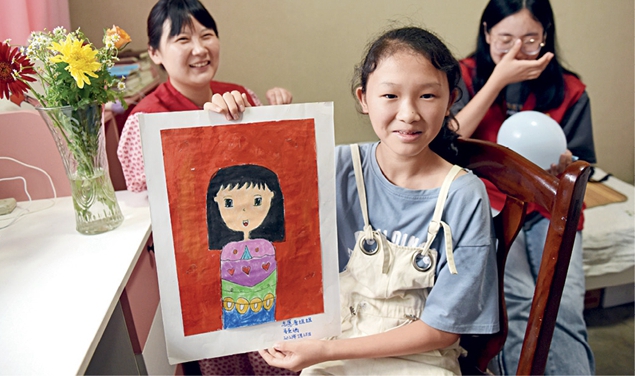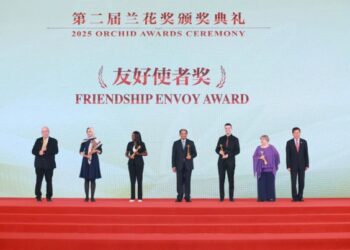An interactive humanoid robot at the Huawei booth at PT Expo China 2024, in Beijing, September 27, 2024
The celebration of the 75th anniversary of the People’s Republic of China (PRC) is, without doubt, a moment of great importance and festivities. It is also a reflective opportunity to examine the remarkable transformation that has occurred in less than eight decades. During this period, China fundamentally changed the world through a series of monumental achievements.
Chief among these achievements is China’s ability to unite a large and diverse population. Anyone familiar with China’s long history knows that it has always been difficult to forge unity in such a vast country. For most of the 19th century and the first half of the 20th century, China was fragmented and rife with conflict, with many regions under foreign influence or control. The founding of the PRC on October 1, 1949, marked a historic turning point, signaling the end of an era of disunity.
The unification of China, after decades of division, was in itself a monumental achievement. The handover of Hong Kong and Macau to China, in 1997 and 1999 respectively, is emblematic of the PRC’s success in strengthening national unity. These events were not only political milestones, but also symbols of a reunified China regaining its place on the international stage.
The second major achievement of the PRC is the eradication of extreme poverty. When I first visited China in the 1990s, I was struck by poverty that was both glaring and distressing. Today, this reality has radically changed. The scale and speed of this progress are unprecedented in world history. Recently, I had the opportunity to spend time in rural areas of Guangdong, Shanxi, and Hunan. In light of the rural revitalization policy, it is evident that the positive changes in China’s countryside are not sufficiently recognized by observers.

National Day decorations in front of the Ruins of Saint-Paul site in Macau, September 28, 2024
As the World Bank points out, China has contributed to almost three-quarters of the global reduction in the number of people living in extreme poverty. Eradicating extreme poverty is a fundamental human right, and China’s achievements in this area demonstrate its commitment to improving the living conditions of its people. The scale of this success reflects the effectiveness of China’s development policies and its ability to lift hundreds of millions of people out of poverty.
The third important achievement lies in the creation of immense wealth and economic growth.
In 1949, it was impossible to predict that China would become the world’s second largest economy. However, today it is a reality. Based on purchasing power parity, China’s GDP ranks first in the world. In 2023, the country contributed 32% to global economic growth.
Chinese companies have become global players, excelling in various sectors and setting benchmarks in industries ranging from technology to manufacturing. No discussion of emerging technologies today would be complete without considering China’s role. From artificial intelligence to applications of quantum physics, China plays a central role and is no longer a mere spectator of history. The growing presence of Chinese tourists, students, academics, scientists, artists and athletes on the world stage is a testament to the country’s economic power and its ability to foster global engagement. This wealth creation has not only enriched China, it has also contributed to a more interconnected and prosperous global economy.
China’s fourth achievement lies in the peaceful nature of its rise on the world stage. Unlike other emerging powers, China’s transformation has not been accompanied by external conflicts. On the contrary, China has pursued its goals with an emphasis on stability and harmony. In my book, Limited Views on The Chinese Renaissance, I argue that China’s strategic intentions are rooted in the concept of “centrality,” which favors balance and coexistence over confrontation. This approach allowed China to re-emerge as a global power without disrupting the existing international order. China rightly advocates gradual reform of global governance, not revolutionary overhaul.

A little girl painted a portrait of the volunteer who assists her in the “house of hope”, a project to support children in the village of Huangjindian, in Linyi (Shandong).
The most important bilateral relationship of our time is that between China and the United States. It is a complex relationship, characterized by significant economic interdependence. Beyond this reality, it is reassuring to note the considerable diplomatic efforts made by the two countries to reduce the strategic trust deficit. Whether conflict between the two nations is inevitable is the subject of much debate. However, a careful examination of the situation reveals that Thucydides’ trap can be avoided and, in fact, has been avoided for decades.
Finally, China’s rejuvenation enriches the world with a multitude of new ideas and perspectives. China’s continued success is a testament not only to its modernity, but also to its distinct non-Western identity. This unique blend of modernity and cultural heritage challenges the traditional Western view of global progress. Modernization is not synonymous with westernization. As China continues to advance, it offers new paradigms and perspectives that contribute to a more diverse and nuanced understanding of global development. Accepting China’s modern, non-Western perspective is essential to fostering a more inclusive international dialogue.
China’s remarkable achievements over the past 75 years have undeniably reshaped our world. Anyone interested in global issues must recognize and consider China’s role and influence. The country’s vision of a community with a shared future for humanity suggests we could be on the path to a world where the revival of an ancient civilization contributes to global progress. If the Chinese renaissance brings significant advances to humanity, it could constitute one of the PRC’s noblest achievements in the decades to come.
*DAVID GOSSET is a sinologist, founder of the China-Europe-America Global Initiative and editor of the book China and the world.







![[Things about China]Foreign media: The United States is busy “building walls” around the world, and China’s open cooperation leads a new economic pattern](https://beijingherald.com/wp-content/uploads/2025/03/Things-about-ChinaForeign-media-The-United-States-is-busy-building-120x86.png)
